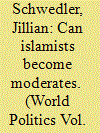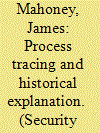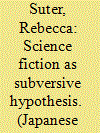| Srl | Item |
| 1 |
ID:
103867


|
|
|
|
|
| Publication |
2011.
|
| Summary/Abstract |
Recent years have seen a surge of studies that examine the inclusion-moderation hypothesis with reference to political Islam: the idea that political groups and individuals may become more moderate as a result of their inclusion in pluralist political processes. Most of these interventions adopt one of three foci: (1) the behavioral moderation of groups; (2) the ideological moderation of groups; and (3) the ideological moderation of individuals. After a discussion of various definitions of moderate and radical, the concept of moderation, and the centrality of moderation to studies of democratization, the author examines the scholarship on political Islam that falls within each approach. She then examines several studies that raise questions about sequencing: how mechanisms linking inclusion and moderation are posited and how other approaches might better explain Islamist moderation. Finally, she offers a critical analysis of the behavior-ideology binary that animates many of these models and suggests some fruitful paths for future research.
|
|
|
|
|
|
|
|
|
|
|
|
|
|
|
|
| 2 |
ID:
106877


|
|
|
|
|
| Publication |
2011.
|
| Summary/Abstract |
Conventional historiography presumes a linear development from urbanisation, the rise of indigenous middle classes and the spread of modernity towards nationalism as the logical outcome of this process. This article aims to disconnect modernity from nationalism by focusing on the role of cultural citizens in the late colonial period for whom modernity was a desirable lifestyle. The extent to which their desires and the interests of the colonial regime coincided is illustrated by a variety of advertisements and school posters, which invited members of the indigenous urban middle class to become cultural citizens of the colony.
|
|
|
|
|
|
|
|
|
|
|
|
|
|
|
|
| 3 |
ID:
101154


|
|
|
|
|
| Publication |
2010.
|
| Summary/Abstract |
In this paper, I discuss the actual conditions and the determinants of co-residence between older parents and their children in China, especially the impact of bequest motives on parent-child co-residence, using micro data from the "Survey of Living Preferences and Satisfaction," conducted at Osaka University. More specifically, I use three subsamples of older respondents (those who live in urban areas, those who live in rural areas, and the pooled sample of both) to analyze the impact of bequest motives and other factors on the probability of parent-child co-residence. The results are as follows: bequest motives are strong in China, with more than 60% of respondents having a bequest motive, and the parent-child co-residence rate is also high (about 60%). Turning to the determinants of parent-child co-residence, children of urban parents are more likely to live with their older parents if their parents have a bequest motive, own their own homes, and live in an area where housing prices are high, a result which is consistent with both the selfish life-cycle and altruism models. Children are more likely to live with their older parents if their parents have a bequest motive in both the rural and combined samples, which implies that children are selfishly motivated and that the selfish life-cycle model applies in China.
|
|
|
|
|
|
|
|
|
|
|
|
|
|
|
|
| 4 |
ID:
140396


|
|
|
|
|
| Summary/Abstract |
This article offers a state of the art of methodological writings on process tracing. Its goal is to encourage the more self-conscious and transparent use of this method in security studies. The article considers process tracing for both theory testing and theory development. First, with theory testing, the article discusses the logic of historical explanation and the use of sequential analysis. It then focuses attention on two kinds of process-tracing tests: hoop tests and smoking gun tests. The article explores the mechanics through which these tests allow investigators to pass judgment on hypotheses. Second, with theory development, the article examines the use of counterfactual analysis and inductive discovery in the process of novel hypothesis formulation. The article shows how process-tracing researchers use event analysis to formulate original explanations of specific outcomes in particular cases.
|
|
|
|
|
|
|
|
|
|
|
|
|
|
|
|
| 5 |
ID:
106802


|
|
|
|
|
| Publication |
2011.
|
| Summary/Abstract |
The article considers the literary sub-genre of henkaku tantei sho-setsu, detective fiction that included supernatural or pseudo-scientific elements. Such stories were published regularly in the interwar entertainment magazine Shinseinen, but this was also a journal with an intellectually sophisticated and politically engaged side, regularly publishing essays on the relationship between science and literature, and reflecting the fluidity and constant change of the period in which it flourished. I look at henkaku tantei sho-setsu's combination of rationalism and fantasy, and its oscillation between enthusiasm and anxiety towards modern science, in order to reflect more broadly on Shinseinen's position between ideas of literature as pure diversion and arguments defending its social and educational function. To investigate the specific articulation of these dynamics, I then offer a close reading of one representative work published in the magazine in 1931, 'Robotto to beddo no ju-ryo-', [The Robot and the Weight of the Bed], by Naoki Sanju-go, one of the founding fathers of modern Japanese popular literature.
|
|
|
|
|
|
|
|
|
|
|
|
|
|
|
|
| 6 |
ID:
091737


|
|
|